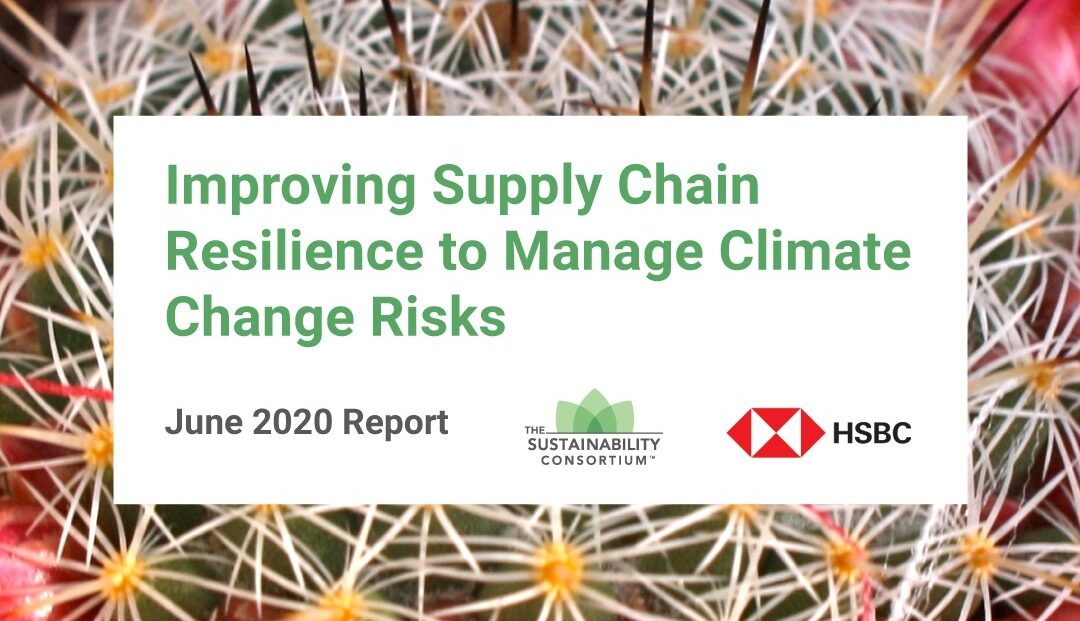New report from HSBC and TSC helps companies understand how and why climate change risks should be addressed within supply chains
NEW YORK and SCOTTSDALE, Ariz – The Sustainability Consortium (TSC) and HSBC released a new report today urging companies to prepare supply chains for the risk of climate change disruptions that threaten to raise costs and jeopardize their ability to meet customer needs.
Co-authored by Dr. Christy Slay, TSC Director of Technical Alignment and Dr. Kevin Dooley, TSC Chief Scientist and faculty at Arizona State University (ASU), with funding and support from the HSBC Centre of Sustainable Finance, Improving Supply Chain Resilience to Manage Climate Change Risk warns that climate change will result in more extreme weather events and continued sea-level rise continue to disrupt supply chains configurations with increasing more frequency. Supply chain disruptions from climate change can increase the cost or lower the quality or quantity of supplies provided to a manufacturing by its suppliers.
Dooley states, “We all see the myriad of supply chain disruptions occurring during the current coronavirus pandemic. Unfortunately this prefaces the types of challenges that supply chains will face in the future from increasing climate change. Now is the time to create more supply chain resilience.”
“As companies worldwide are in the midst of dealing with COVID-19’s impact on their business operations and their supply chains, current events put in sharp relief the impact of supply chain disruptions on a global scale,” said Patricia Gomes, Regional Head of Global Trade and Receivable Finance (GTRF). “We’re helping our customers think holistically about supply chain risks, and this report provides valuable insight into planning for, and mitigating disruptions caused by, climate change.”
The whitepaper also found that:
- Climate change risks may also force more investor attention on a company’s supply chain related to greenhouse gas (GHG) emissions. To better plan for the future, companies need to incorporate climate change into a broader supply chain risk management strategy.
- Bridging and buffering are strategies to enhance a company’s ability to withstand risk events and protect against inevitable failures and supply disruptions. Risk events include increased cost, lower quality supply, and delayed supply, where a disruption can delay delivering goods or services to a company’s own customers.
- Companies that address resiliency can be more attractive to employees, customers, and investors. The authors include a supply chain climate resiliency questionnaire for those wanting to do a quick assessment of a company’s supply chain resiliency or discuss with managers.
TSC is a global organization propelling the consumer goods industry forward to create more sustainability products through science-based assessments and solutions. In order to create change on a global scale, in an increasingly volatile world, TSC incentivizes and supports manufacturers and their suppliers to adopt new practices and design more sustainable products. Their full impact report is available here.
The HSBC Centre of Sustainable Finance provides thought leadership about transforming the real economy and strengthening the financial system response to climate change. HSBC’s in-house think tank, the Centre generates and promotes publicly available reports that support the climate change ambitions of key stakeholders including industry, financial regulators, governments and financial institutions.
Media enquiries to:
Erika Ferrin, Senior Director of Marketing, Communications and Development TSC, (480) 965-7752, [email protected]
&
Oksana Poltavets, Vice President of Communications HSBC USA, (212) 525-8226, [email protected]
Note to editors:
About HSBC — HSBC Holdings plc, the parent company of the HSBC Group, is headquartered in London. HSBC serves customers worldwide from offices in 64 countries and territories in our geographical regions: Europe, Asia, North America, Latin America, and Middle East and North Africa. With assets of US$2,918bn at 31 March 2020, HSBC is one of the world’s largest banking and financial services organizations.
About TSC — The Sustainability Consortium (TSC) is a global non-profit organization transforming the consumer goods industry to deliver more sustainable consumer products. We work to enable a world where people can lead fulfilled lives in a way that decouples their impacts on people and the planet. Our members and partners include manufacturers, retailers, suppliers, service providers, NGOs, civil society organizations, governmental agencies and academics. TSC convenes our diverse stakeholders to work collaboratively to build science-based decision tools and solutions that address sustainability issues that are materially important throughout a product’s supply chain and lifecycle. TSC also offers a portfolio of services to help drive effective improvement and implementation. Formed in 2009, TSC is jointly administered by Arizona State University and the University of Arkansas and has a European office at Wageningen University and Research in the Netherlands. For more information visit www.sustainabilityconsortium.org.

